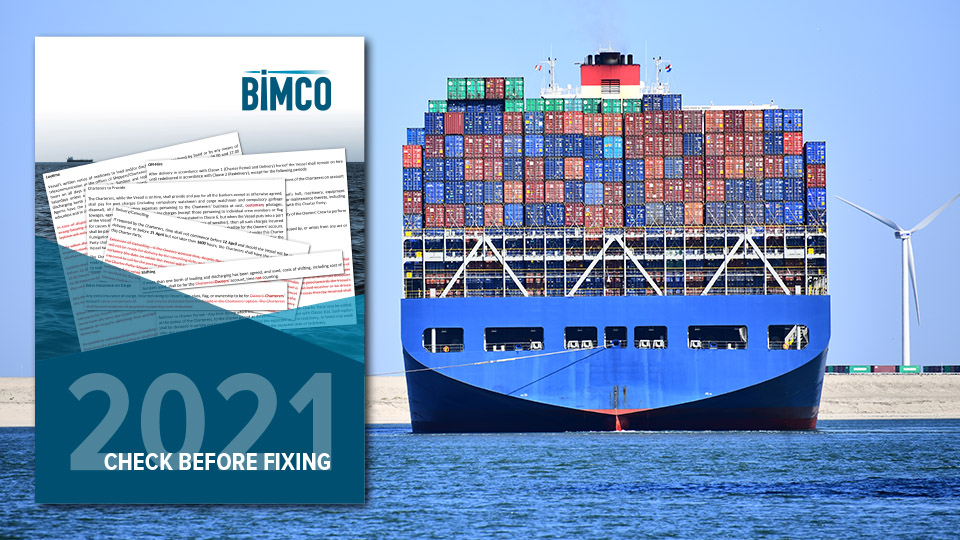Average Bond Clause 2007
Overview
The BIMCO Average Bond Clause 2007 has been updated. The main change is in the final paragraph where the shorter limitation period previously applicable to adjustments arising under the York Antwerp Rules 2004 no longer applies. As a result, in all cases rights to claim under the clause have been brought into line with the six-year limitation period under English law. A number of minor editorial improvements have also been made.
The clause is for use only in contracts of carriage where General Average is to be adjusted, stated and settled according to the York-Antwerp Rules 1994.
If the York-Antwerp Rules 2016 apply to the underlying contract, the BIMCO Average Bond Clause 2018 must be used.
This clause was originally published in June 2005, amended in October 2007, 2017 and 2018.
Average Bond Clause 2007
BIMCO Average Bond Clause 2007
On presentation of this bill of lading and
(i) payment of any freight due; and
(ii) provision of a General Average guarantee or deposit in respect of General Average, Salvage and Special Charges,
it is agreed that, in consideration of the delivery of the cargo described on the face of this bill of lading (“the cargo”) to the presenter of the bill of lading, or to order, the party or parties presenting this bill of lading, or their assigns, shall, without the provision of an average bond:
(a) pay the proper proportion of any general average and/or salvage and/or special charges which may be ascertained to be properly due from the cargo or the shippers or owners thereof,
(b) where appropriate, contribute to general average and/or salvage and/or special charges in accordance with an adjustment prepared pursuant to the non-separation wording contained in Rules G and XVII of the York-Antwerp Rules 1994,
(c)
(i) at the time of presentation of the bill of lading, furnish a copy of the commercial cargo invoice rendered to the receiver, and
(ii) as soon as is reasonably practicable following delivery of the cargo, supply evidence to the Carrier, their Agent or the appointed average adjuster of the nature and value of any damage to or loss of the cargo.
(d) following delivery of the cargo make a payment on account of such sum as is certified by the average adjuster to be properly due from the cargo and is payable in respect of such cargo by the shippers or owners thereof.
Rights to claim under this Clause shall be extinguished, unless an action is brought by the party claiming within a period of six years from the date of issue of the general average adjustment.
Explanatory notes
Background
A declaration of General Average (GA) often leads to time being spent and costs incurred obtaining GA security from individual cargo interests and their insurers. The purpose of the Average Bond Clause is, as far as possible, to minimise the time it takes to obtain such security and reduce delay in the delivery of cargo after the general average event. This is achieved by inserting the terms of an Average Bond in the contract of carriage, which removes the need to obtain the consignee’s or the shipper’s signature to a separate document.
Incorporating the Average Bond Clause in your contracts of carriage is intended to:
a) reduce delay in the delivery of cargo following a GA event; and
b) reduce the costs of the average adjustment.
The BIMCO Average Bond Clause was first published in June 2005. It was revised in 2007 following concerns expressed by the Association of Average Adjusters (AAA) in London about practical issues surrounding the requirements for the provision of insurers’ identity, contact details and policy information when the bill of lading was presented. This could also create difficulties for cargo underwriters providing a guarantee after the cargo had been released against the bill of lading.
The preamble was amended to address the concerns. The revised Clause was endorsed by the Documentary Committee at its meeting in May 2007.
The latest amendments were approved by the Documentary Committee at its meeting in May 2018.
The Secretariat is grateful to the AAA for their involvement in the development of the Average Bond Clause and for the practical comments submitted.
Commentary
Preamble requires the presenter of the bill of lading to provide satisfactory security to cover general average, salvage and special charges in addition to the payment of any freight.
Subclause (a) identifies the party presenting the bill of lading as the party liable to pay, among others, the General Average contribution.
Subclause (b) incorporates a form of non-separation wording in line with the provisions of the York Antwerp Rules 1994. This is expected to result, in appropriate cases, in considerable savings of time in obtaining security.
Subclause (c)(i) provides that the party presenting the bill of lading must promptly furnish details of the value of the cargo, to expedite any GA proceedings.
Subclause (c)(ii) places the burden of providing details of any loss or damage to cargo, giving rise to either a claim in GA or a reduction in the contributory value of the cargo, on the party presenting the bill of lading or his assigns.
Subclause (d) obliges the presenter of the bill of lading or his assigns to make a payment on account of their contribution when this is certified by the average adjuster, but only when there is no defence to such a claim under the contract of carriage, or otherwise.
The final paragraph provides that, in all cases, the time limit for claiming a contribution under the clause is to be the same as that presently applicable under English law i.e., six years from the date of the average adjustment.
Originally published in BIMCO Special Circular No 6, June 2005 - BIMCO Average Bond Clause, modified in October 2007, June 2017 and July 2018.
Related Help & Advice
Create or edit a contract
The one-stop digital shop for all the standard maritime contracts and clauses you’ll ever need.
Latest Related News
-
BIMCO adopts portfolio of four ETS clauses
The shipping industry is facing an increase in new regulations from the International Maritime Organization (IMO) and the European Union (EU) and an increase in the urgency to decarbonise. To support the industry, BIMCO has developed a portfolio of new emission trading scheme (ETS) clauses.
-
BIMCO adopts new CII clause for Voyage Charter Parties
The shipping industry is facing an increase in new regulations from the International Maritime Organization (IMO) and the European Union (EU) and an increase in the urgency to decarbonise. To support the industry, BIMCO has developed a new CII Clause for Voyage Charter Parties. The clause was adopted by BIMCO’s Documentary Committee on 11 October and is the latest addition to BIMCO’s portfolio of carbon clauses.
-
BIMCO’s CII clause adopted
The BIMCO Documentary Committee has adopted a CII Operations Clause for Time Charter Parties which will help the industry commercially navigate the complexities of the new CII regulations from the International Maritime Organization (IMO).
-
Fumigation
BIMCO providing information and guidance relating to fumigation of cargoes that are shipped under the IMSBC Code, the Grain Code and the IMDG Code.
-
BIMCO publishes EEXI Transition Clause ahead of IMO efficiency regulation
New regulation from the International Maritime Organization (IMO), which will require existing ships to reduce carbon emissions, is due to enter into force in just under one year. As compliance will benefit to a large extent from co-operation between shipowners and charterers, BIMCO has developed a new clause to address the changes.
ELSEWHERE ON BIMCO
Holiday calendar
BIMCO's Holiday Calendar covers general holidays in over 150 countries, plus local holidays and working hours in more than 680 ports around the world.
Learn about your cargo
For general guidance and information on cargo-related queries.




